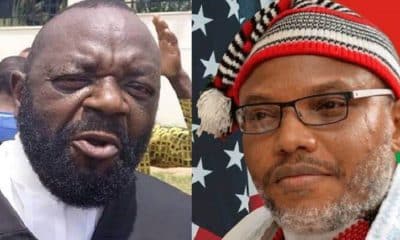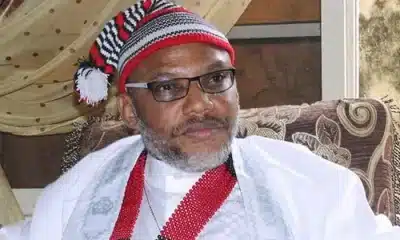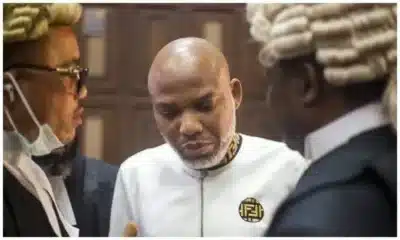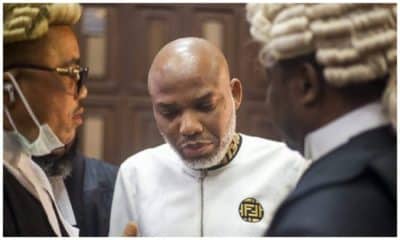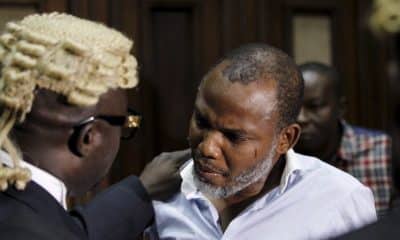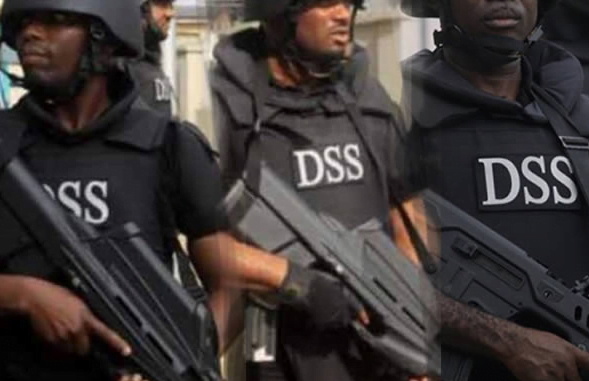Nigeria News
Nnamdi Kanu Rejects Criminal Charges, Files Appeal Against FG

The detained leader of the Indigenous People of Biafra (IPOB), Nnamdi Kanu, has filed an appeal at the Appeal Court against the criminal charges the Nigerian government preferred against him.
Kanu, who filed the appeal through his legal team led by Aloy Ejimakor, rejected the March 19 ruling of Justice Binta Nyako of the Federal High Court sitting in Abuja on the charges filed against him.
According to the notice of appeal court document, Kanu’s legal team informed the Appeal Court that the lower court erred when it denied the IPOB leader his constitutional right to a fair trial.
Kanu also noted that the Department of State Services (DSS), failed to provide adequate facilities to prepare for the defence of the criminal allegations against the Appellant and his right to counsel of his own choice, thereby occasioning a grave miscarriage of justice.
The notice of appeal with charge No: FHC/ABJ/CR/383/2015, reads, “Take Notice that the Appellant being dissatisfied with the Ruling of the Federal High Court, Abuja Division coram: B.F.M Nyako, J. delivered on the 19th March, 2024 doth hereby appeal to the Court of Appeal Abuja upon the grounds set out in Paragraph 3 below and will at the hearing of the appeal seek reliefs as set out in Paragraph 4 hereof from the Court of Appeal.
“The Learned Trial Court erred in law when the Court assumed jurisdiction to proceed with the hearing of the criminal trial against the Appellant when the Appellant is glaringly denied the constitutional right to a fair trial with particular reference to the denial of adequate facilities to prepare for the defence of the criminal allegations against the Appellant and his right to counsel of his own choice, thereby occasioning a grave miscarriage of justice.
“Fair hearing/trial bears the constitutional safeguards of ensuring that the Appellant is accorded the adequate facilities to prepare for the defence of the criminal allegations levelled against the Appellant.
“The denial of the Appellant the opportunity to interact and brief his counsel on what line of defences the Appellant tends to agitate in the trial court and rely on was adequately brought to the attention of the trial Court by Motion.
“The trial Court failed and neglected to make necessary orders that would protect the Appellant’s aforesaid rights but rather held that the court cannot dictate how the Respondent carries out its work.
“The trial Court has the powers to order the Respondent (being the detaining authority) to cease and desist from interfering with Appellant’s constitutional/fair hearing right to adequate facilities to prepare a defence and his right to counsel of his choice; and where it is impossible to do so or where the Respondent persists, the trial court has the power to order an alternative custodial arrangement or non-custodial arrangement for the Appellant.
“Denial of the Appellant’s right to adequate facilities to prepare defence as enshrined in Section 36 (6) (b) of the Constitution of the Federal Republic of Nigeria, 1999 is a jurisdictional issue in the absence of which the trial Court cannot assume or proceed with the jurisdiction over the case unless and until such facilities are accorded to the Appellant.”
The legal team also accused the trial judge of erring when she held that “I cannot make orders directing a security agency on how to do their work.
“I can only direct that whatever is within the law must be allowed to the Defendant. Counsel cannot direct the court or give condition to the court on how to conduct its business.
“The Defendant is entitled to a counsel of his choice and should be given the facility to conduct an interview with his counsel within the confines of the law.”
The detained IPOB leader, by a notice of preliminary objection, prayed the appellate court to find and hold that trial in the case cannot proceed except, the “respondent stopped the unconstitutional acts of forcibly seizing and photocopying confidential legal documents brought to the Appellant by the Appellant’s lawyers meant for the Appellant’s defence of the charges against the Appellant.
He also accused Justice Nyako of erring in law by ordering for accelerated hearing of the case given the facts of the case showing that the respondent had consistently refused to afford the Appellant the right to the adequate facility to prepare for the defence of the charges levelled against the Appellant and his right to counsel, and thereby occasioned a miscarriage of justice against the Appellant and in favour of the Respondent.
Kanu stressed that the judge cannot order an accelerated hearing of a criminal charge where it is brought to the attention of the Court that the Appellant is denied the adequate facilities to prepare his defence and his right to counsel.

